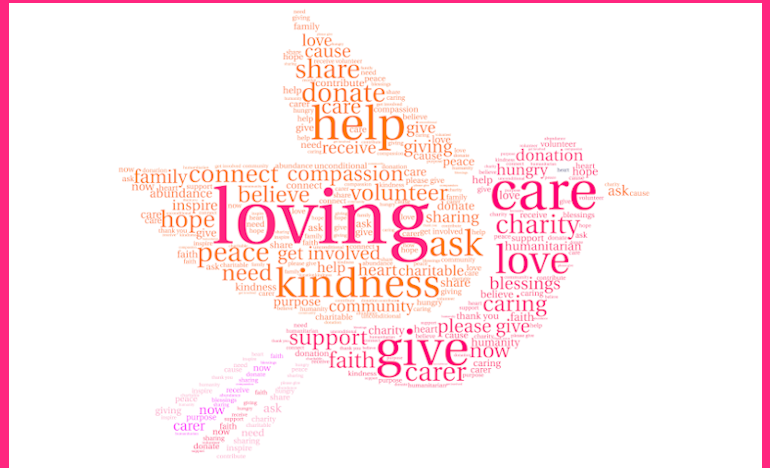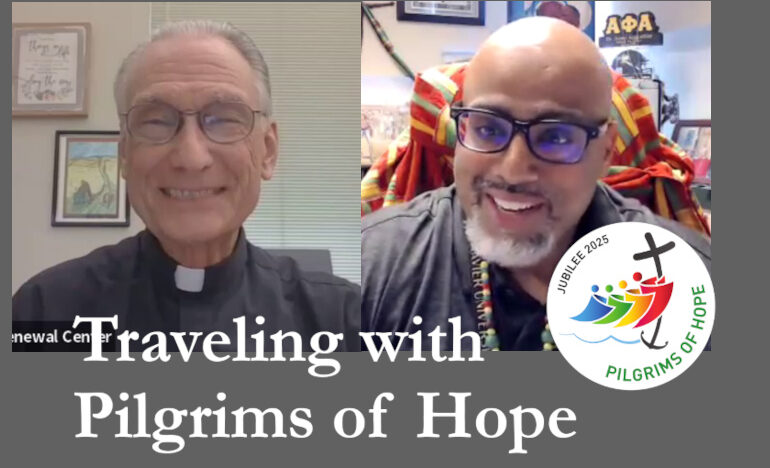‘Loving-Kindness’ in the Buddhist and Christian Traditions

“Love must be remade each day, baked fresh like bread.”
—Ursula Le Guin,
American novelist
By Kathy Keary
Part 10. Read all the parts of the Jesus and Buddha series here.
Last week, we discussed the states of mind known in Buddhism as Brahma-viharas: loving-kindness (metta), compassion (karuna), appreciative joy (mudita), and equanimity (upekkha). Today we will explore loving-kindness from both a Buddhist and Christian perspective.
In the article, “Brahma-Vihara: The Four Divine States or Four Immeasurables,” Barbara O-Brien describes metta or loving-kindness as “benevolence toward all beings, without discrimination or selfish attachment.” When one practices this trait, the love one holds for all beings is likened to the affection a mother feels for her child. She states that characteristics such as anger, ill will, hatred, and aversion are eliminated.
Note: Never miss an article published on the Renewal Center website: Sign up to receive our newsletters
In the article, “The Four Brahma Viharas,” One Mind Dharma asserts metta or “gentle friendliness,” another translation of metta, is a quality of the heart that is nurtured for the sake of all sentient beings including the practitioner. It is described as “the opening of the heart to the experience of others” cultivated through-loving kindness meditation.
In the DVD series, Jesus and Buddha: Paths to Awakening, Catholic priest and Franciscan Richard Rohr emphasizes that the spiritual qualities such as the Brahma-viharas are increased by choosing these attributes daily. He points out that these same traits are sometimes referred to as The Four Limitless Qualities explaining that they are limitless because they reside within us.
Rohr offers a seven-step meditation designed to access The Four Limitless Qualities.
- Acknowledge the attribute (loving-kindness, compassion, joy, or equanimity) within you.
- Then draw upon the attribute within you and awaken and send it to a person who is close to you that you love very much.
- Then awaken and send the attribute to a friend or associate who is not in your inner circle of family and best friends but would fall in the second circle.
- Then awaken and send the attribute to someone about which you feel indifferent.
- Then awaken and send the attribute to someone who has hurt you or someone you find difficult to like.
- Then lump together these first five categories sending the attribute to the people in each category. This step emphasizes that extending the attribute is not dependent on the worthiness of the recipient.
- In the final step, extend the attribute to all beings in the universe without exception.
In his book, No Time Like the Present: Finding Freedom, Love, and Joy Right Where You Are, Jack Kornfield, a Buddhist professor, author, and psychologist, offers sound advice for routinely awakening the love that rests within each of us:
The American novelist Ursula Le Guin reminds us, “Love must be remade each day, baked fresh like bread.” Modern neuroscience reinforces that while love is native to us, it is also a quality that can be developed. Like gratitude and forgiveness, love can be invited, nourished, and awakened. It can flower and expand. It can become our way, no matter what. Every great spiritual tradition understands this.
Love is a dominant thread that binds Christianity. It is the centerpiece around which the teachings of Jesus rotate. The love to which Jesus calls us is inclusive, unconditional, and extends to those that we may find difficult to love. Jesus challenges us:
You have heard that it was said, ‘You shall love your neighbor and hate your enemy.’ But I say to you, love your enemies, and pray for those who persecute you, that you may be children of your heavenly Father, for he makes his sun rise on the bad and the good, and causes rain to fall on the just and the unjust. For if you love those who love you, what recompense will you have? Do not the tax collectors do the same? And if you greet your brothers only, what is unusual about that? Do not the pagans do the same? So be perfect, just as your heavenly Father is perfect.
In his book, Eager to Love: The Alternative Way of Francis of Assisi, Richard Rohr asserts that Francis’ eagerness to love was the “core and foundation of his spiritual genius.” Rohr challenges us to recognize that the giving and receiving of love always requires a “very real dying to our present state.” He elaborates: “Whenever we choose to love, we will – and must – die to the who we were before we loved.”
In this season of Lent, let us recall that Francis received the stigmata toward the end of his life. Rohr concludes: “I think this means that Francis learned the message, price, and glory of love in the very cells of his body. … Francis seems to exemplify someone who fully absorbed the Gospel with his entire being, not just with his head.”
As we conclude this article, I leave you with a prayer penned by the spiritual leader and activist, Marianne Williamson:
May my selfish nature melt away, dear God, and compassion come to take its place. May everyone I meet or even think of today be blessed by the love I send their way. I will receive as I decide to give, and today I choose to give love.
Amen!!!
References
Finley, James and Rohr, Richard. Jesus and Buddha: Paths to Awakening. Albuquerque, NM: Center for Action and Contemplation, 2017.
Kornfield, Jack. No Time Like the Present: Finding Freedom, Love and Joy Right Where You Are. New York, NY: Atria Books, 2017.
O’Brien, Barbara. “Brahma-Vihara: The Four Divine States or Four Immeasurables.” Learn Religions, April 16, 2019. https://www.learnrelibions.com/brahma-vihara-the-four-divine-states-449717
Rohr, Richard. Eager to Love, The Alternate Way of Francis of Assisi. Cincinnati, OH: Franciscan Media, 2014.
“The Four Brahma Viharas.” One Mind Dharma. https://oneminddharma.com/brahma-viharas.
Williamson, Marianne. A Year of Miracles: Daily Devotions and Reflections. New York, NY: HarperCollins Publishers, 2013.
[Kathy Keary, a Precious Blood Companion and spiritual director, holds a master’s degree in theological studies and is a graduate of the Atchison Benedictine’s Sophia Center’s Souljourners Program, an intense study of spirituality and spiritual direction. Kathy believes that the divine is present and active in all of life and encourages others to be awakened to the God in all including the divine within. She enjoys accompanying others on their journey to wholeness discovering the person they were created to be.]
Illustration 99532597 © Arloofs | Dreamstime.com
We’d Like to Hear From You!
We’d like to know what you think about this article. Send us a comment using the form below. Do you have a suggestion? Is there something you want to learn more about? Send us a note.
Related

Can You Help Support Our Guest House Mission?
The Missionaries of the Precious Blood, the religious society of priests and brothers who sponsor Precious Blood Renewal Center, are asking for donations to update and renovate the Renewal Center’s Guest House.

Pilgrims of Hope, Episode 8: Walking Outside Church Walls
Hosted by Fr. Ron Will, C.PP.S.
In this episode of the Jubilee Year video series, “Traveling with Pilgrims of Hope,” we talk with Ansel Augustine, M.Div., about his more than 25 years of ministry to youth, college students, prisoners and others travelling “outside the church walls.”
Categories
Assembling God's Puzzle Coffee with Padre Cooking & Spirituality Encounters of the 4th Kind Family Matters Reflections on the Eucharsitic Prayers Spiritual Resources Taize Prayers The Contemplative Life Traveling with Pilgrims of Hope Uncategorized Videos Week of Prayer for Christian Unity When you need a little help
